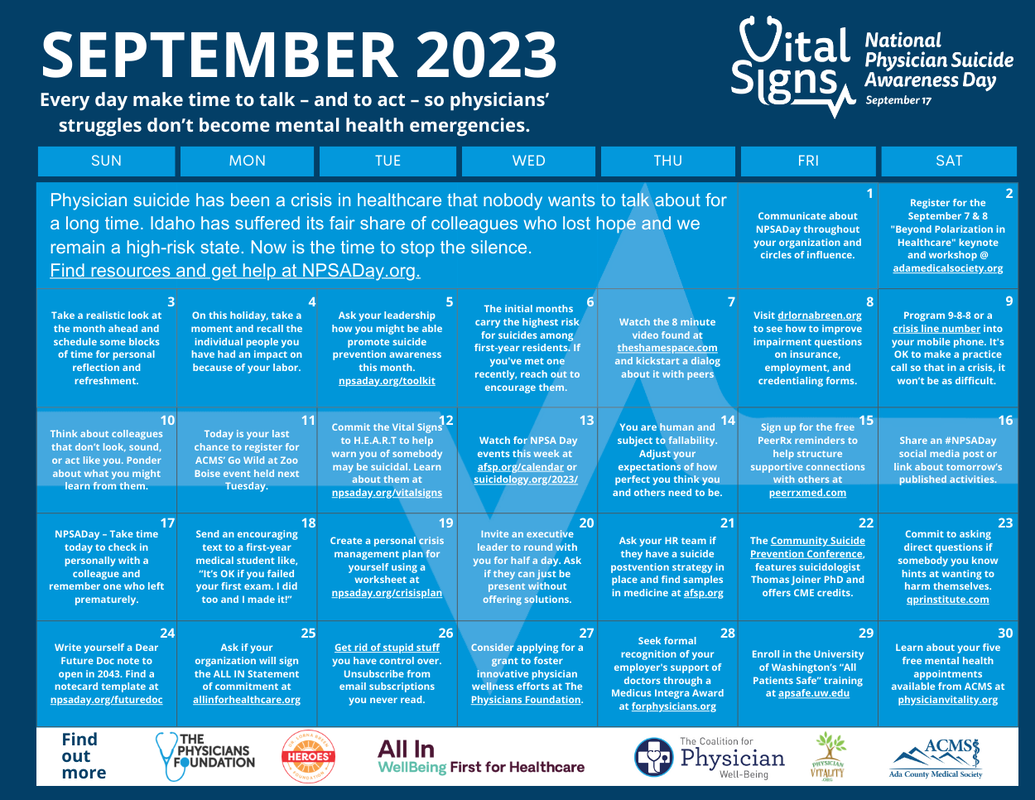YOU ARE NOT AS ALONE AS YOU MIGHT FEEL
|
You have been trained to think that if you cannot come up with a solution, then there is no solution.
So If you've made a medical error that harmed a patient Or are threatened with malpractice Or experienced marital discord Or did something illegal Or are in financial ruin Or simply depressed ... You might think that ending your life will solve all your problems. But this is faulty programming. And you can overcome it. |
You are not the only one who has faced overwhelming challenges and emerged alive.
Your life does matter to other people: your family, your patients, your colleagues. You have tremendous potential for taking action. After all, you made it through medical school. There are always other options. |
Idaho Crisis and Suicide Hotline
National Suicide Hotline - 988
When people call, text, or chat 988, they will be connected to trained counselors that are part of the existing National Suicide Prevention Lifeline network. These trained counselors will listen, understand how their problems are affecting them, provide support, and connect them to resources if necessary.
The historic Lifeline phone number (1-800-273-8255) also remain available to people in emotional distress or suicidal crisis, even after 988 was launched nationally in 2022.
The historic Lifeline phone number (1-800-273-8255) also remain available to people in emotional distress or suicidal crisis, even after 988 was launched nationally in 2022.
National Physician Suicide Awareness Day
September 17, 2023
NPSA Day Resources, Social Media Posts, and Events - Vital Signs NPSA Day
2023 is the sixth year of this event committed to honoring the memory of our colleagues who have died by suicide and to continue to raise awareness and discussion on how to prevent it. Find a bevy of resources you can deploy to heighten awareness around suicide.
September 2023 Calendar (ACMS Version) | Generic Version (Non-ACMS) | Customizable September 2023 Calendar
2023 is the sixth year of this event committed to honoring the memory of our colleagues who have died by suicide and to continue to raise awareness and discussion on how to prevent it. Find a bevy of resources you can deploy to heighten awareness around suicide.
September 2023 Calendar (ACMS Version) | Generic Version (Non-ACMS) | Customizable September 2023 Calendar
Identifying At-Risk Physicians
|
AMA's StepsForward provides a checklist for helping identify physicians who may be at risk of suicide, helping facilitate access to appropriate care, and answering common questions about physician distress and suicidal behavior.
American Foundation for Suicide Prevention has a full page of resources around physician suicidality, including links to toolkits for medical schools and residency programs for suicide post-vention (which could be adapted at a hospital or health system level). |
|
Helping At-Risk Physicians
|
How to Reach Out to a Colleague in Distress
Dr. Dike Drummond from TheHappyMD.com shares this five minute video and walks you through some tips on how to reach out to a fellow physician or other human in distress. Vital Signs by The Physicians Foundation This project lists five vital signs to watch for in colleagues and has a nice conversation tips sheet on having a difficult conversation with somebody you recognize is struggling. |
What to say to a colleague who is suicidal
QPR Insitute's Curriculum: Question - Persuade - Refer QUESTION the person directly about suicide without being vague: "Have you ever had thoughts, feelings, or plans about ending your life?" There is a common misconception that by asking about it, you increase the risk and statistics show the exact opposite. PERSUADE the person to get help. Remember to listen carefully and without judgment and then say, "Let me help" or "Come with me to find help!" Once you are on notice, you need to take responsibility and you're GOOD at this because your medical training has taught you how. Remind them that they are not the only ones that have ever felt this. REFER for to resources which can help and make a warm hand-off. Make the call to the suicide prevention hotline together, help them make an EAP appointment, or through the Physician Vitality Program if you are an Idaho clinician. If they are in imminent danger, do not leave them: call 9-1-1 or take them to the hospital. Follow-up and find out what steps they are taking to get healthy. Find out what means of taking their own life they have easy access to and remove them (firearms, narcotics, etc). |


